Intel Takes Shots at AMD Laptop Battery Performance, Nothing on Apple M1
Intel takes a shot at AMD's laptop battery life
Intel has released internal performance benchmarks that suggest that laptops with its 11th Gen "Tiger Lake" mobile processors deliver far superior performance on battery than those using AMD's Ryzen 4000-series CPUs.
Five Intel and five AMD systems were tested with "out of the box" settings, with the default battery slider set to "better performance." The big changes made were that antivirus software was removed and that the screen brightness was set to 200 nits on each device.
Notably, only two of Intel's systems are Evo-certified - the MSI Prestige 14 and Lenovo Yoga 9i.

Intel's own tests admit that the AMD systems have slightly higher battery life on the MobileMark 18 battery life test, but found that the score on that benchmark - and others, was superior on its own chips on battery. Be aware, of course, that Intel ran these benchmarks, and we take all vendor-provided benchmarks with a grain of salt, as test configurations and benchmarks often are selected to highlight best or worst-case scenarios.
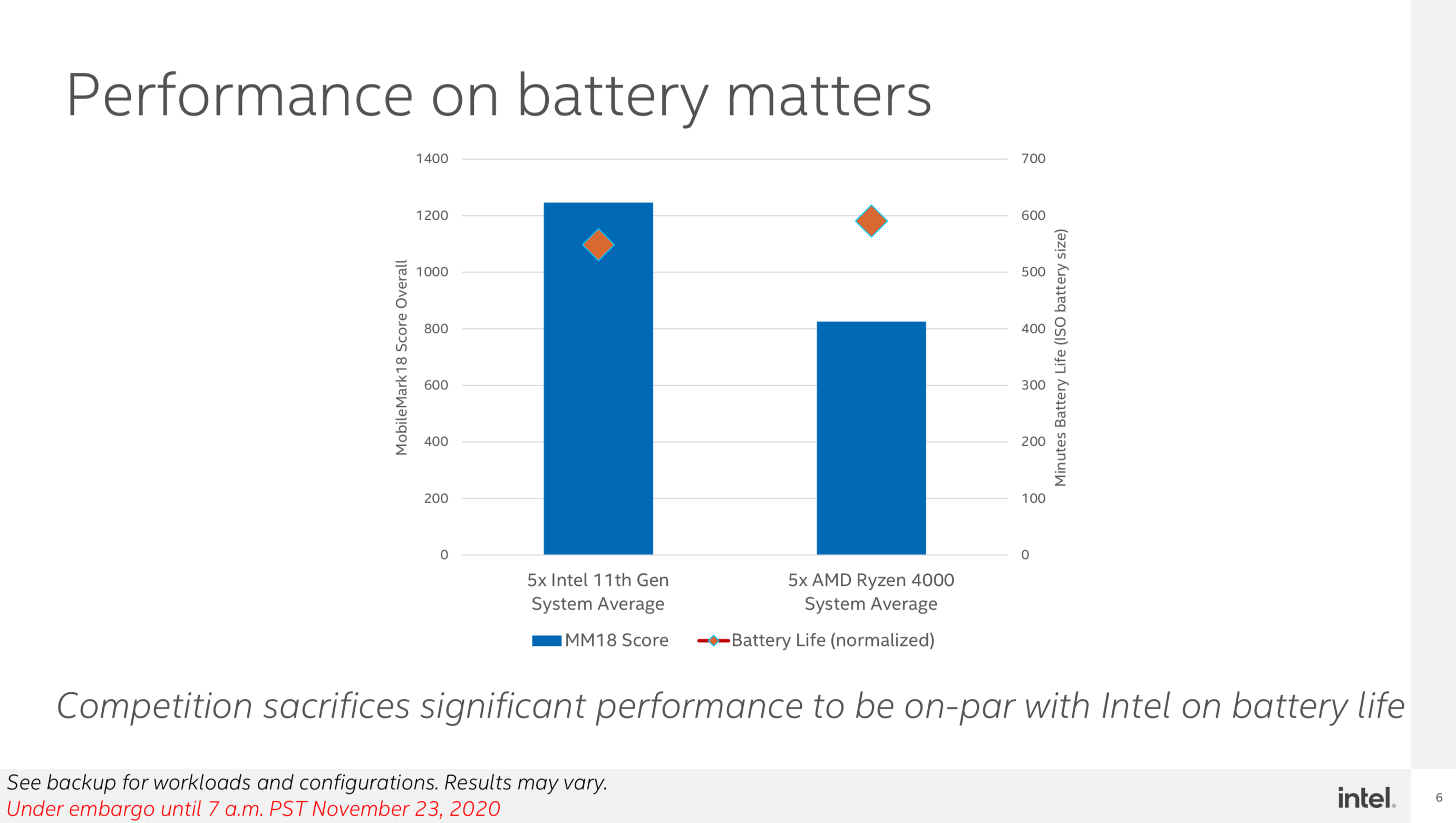
In PCMark 10 using Office 365 applications, Intel said AMD laptops "see up to 38% reduction in performance" on battery power. In WebXPRT, a test that has become an Intel favorite recently, AMD's systems dropped to a 48% reduction in performance. On SYSmark 25, that went to a 30% drop.
Intel chief performance strategist Ryan Shrout said that the AMD numbers "pancaked" when unplugged, effectively removing the differences between a Ryzen 7, Ryzen 5, and Ryzen 3 while on battery power.
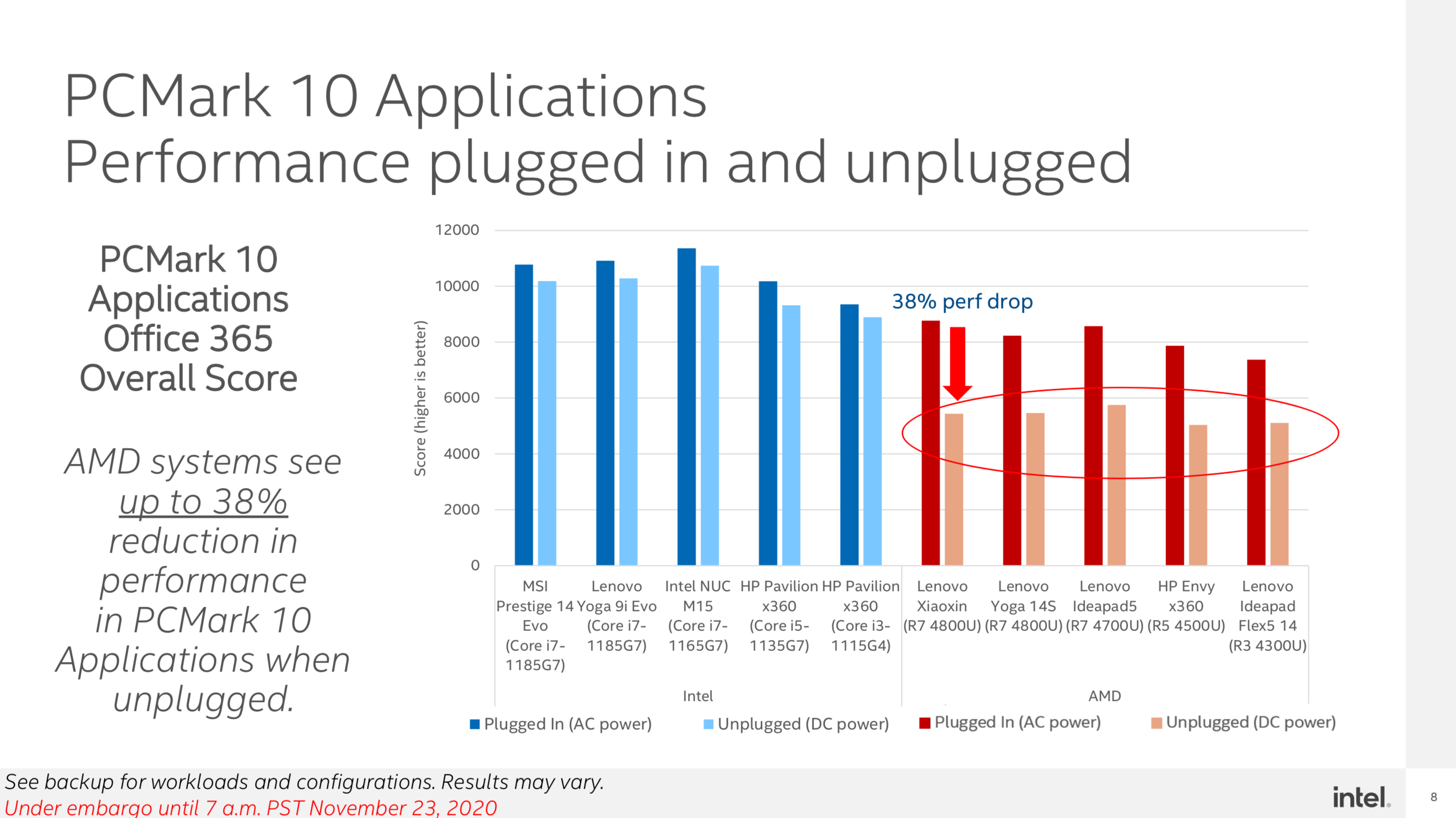
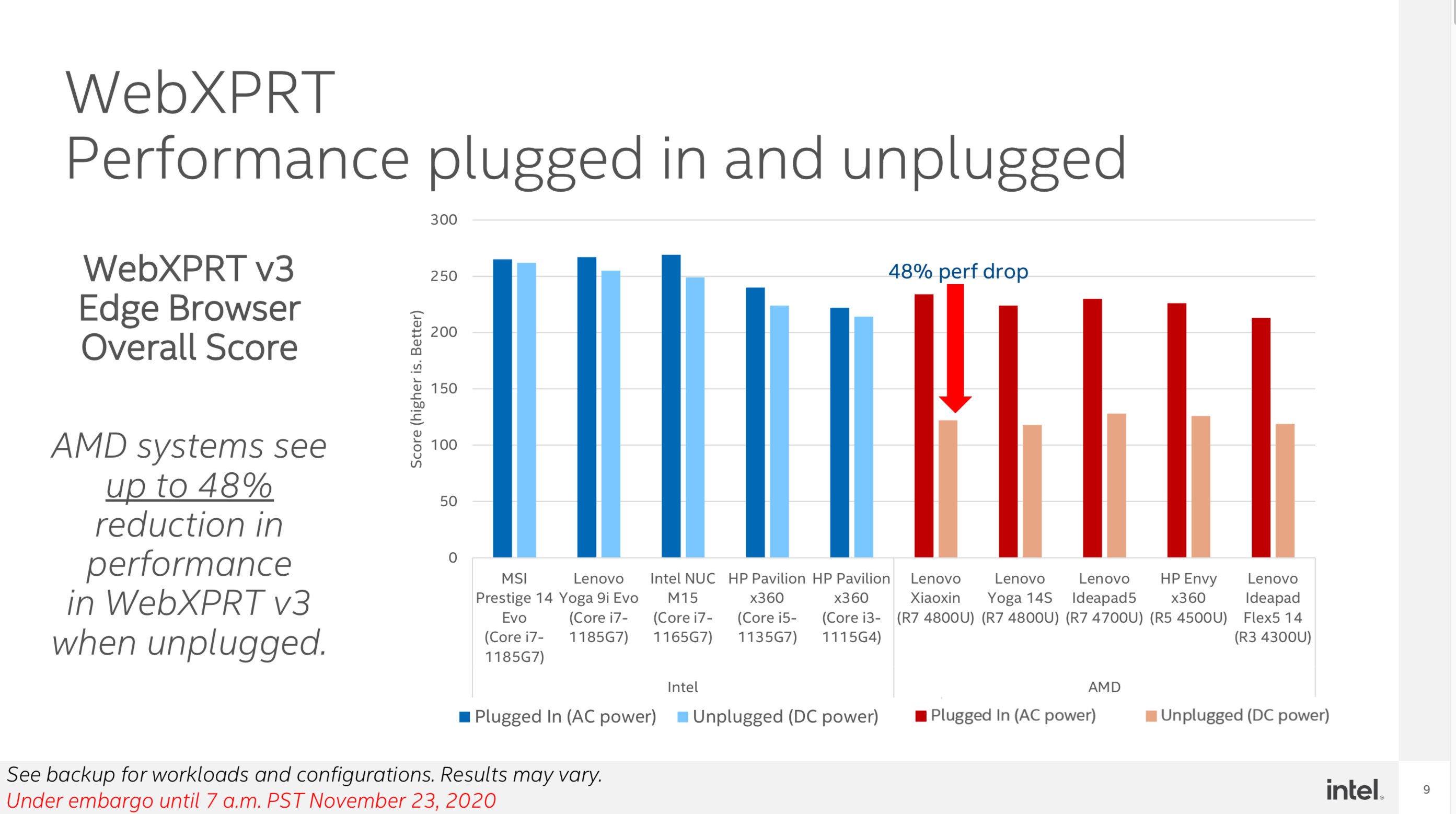
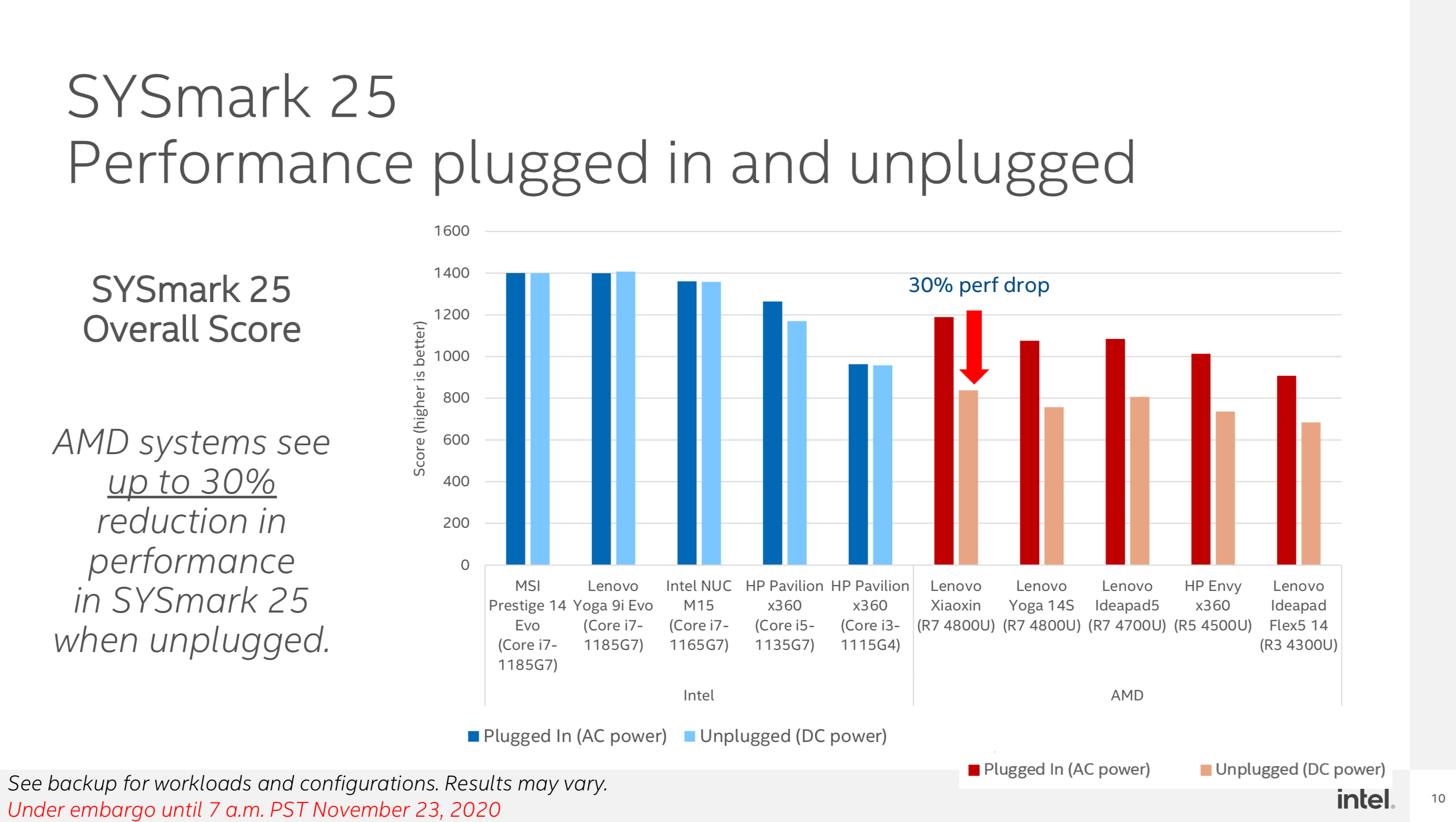
Intel also showed off results in its Realistic Usage Guide (RUG) tests, where the reductions were noticeable, but a bit less dramatic.
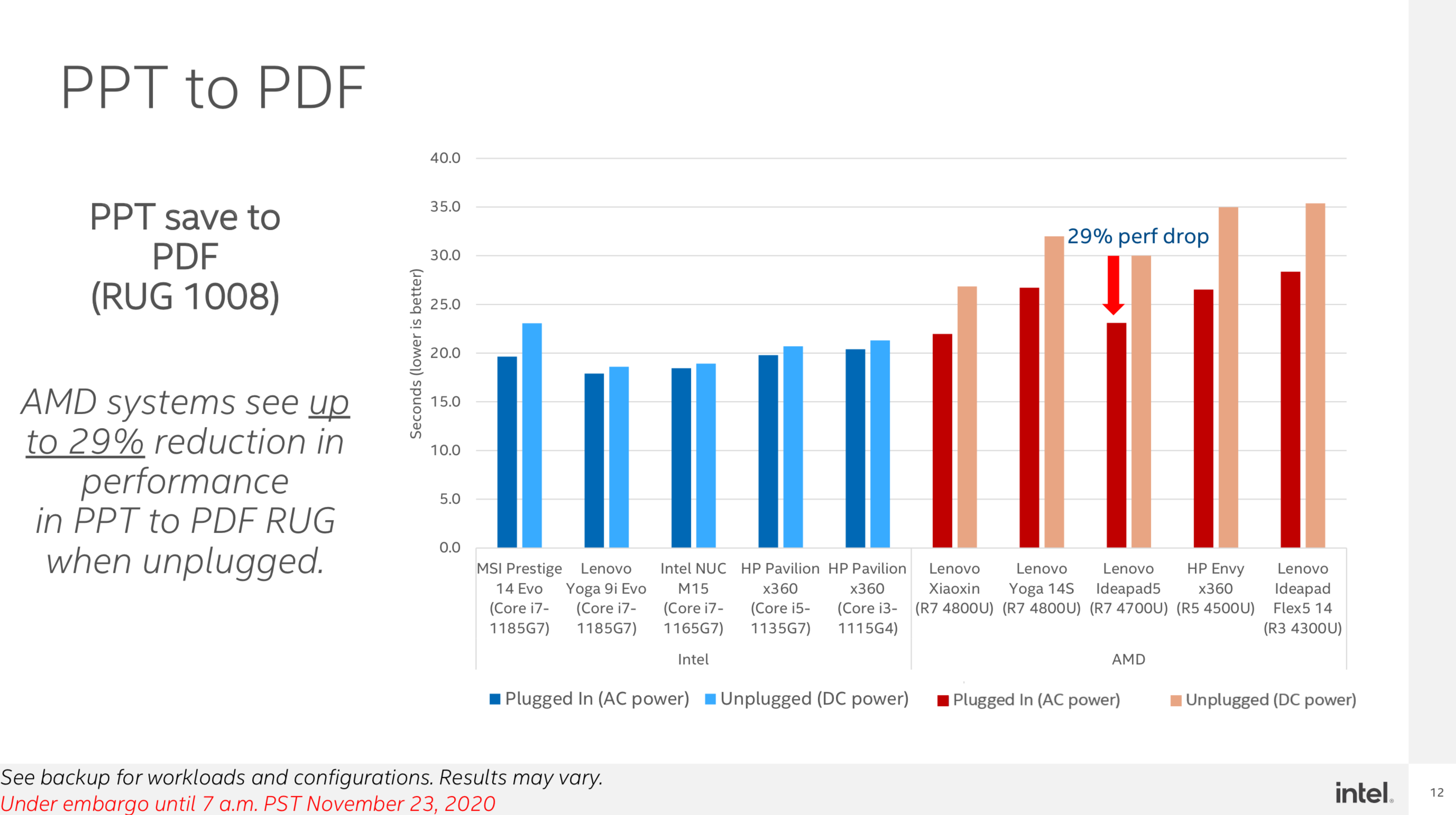
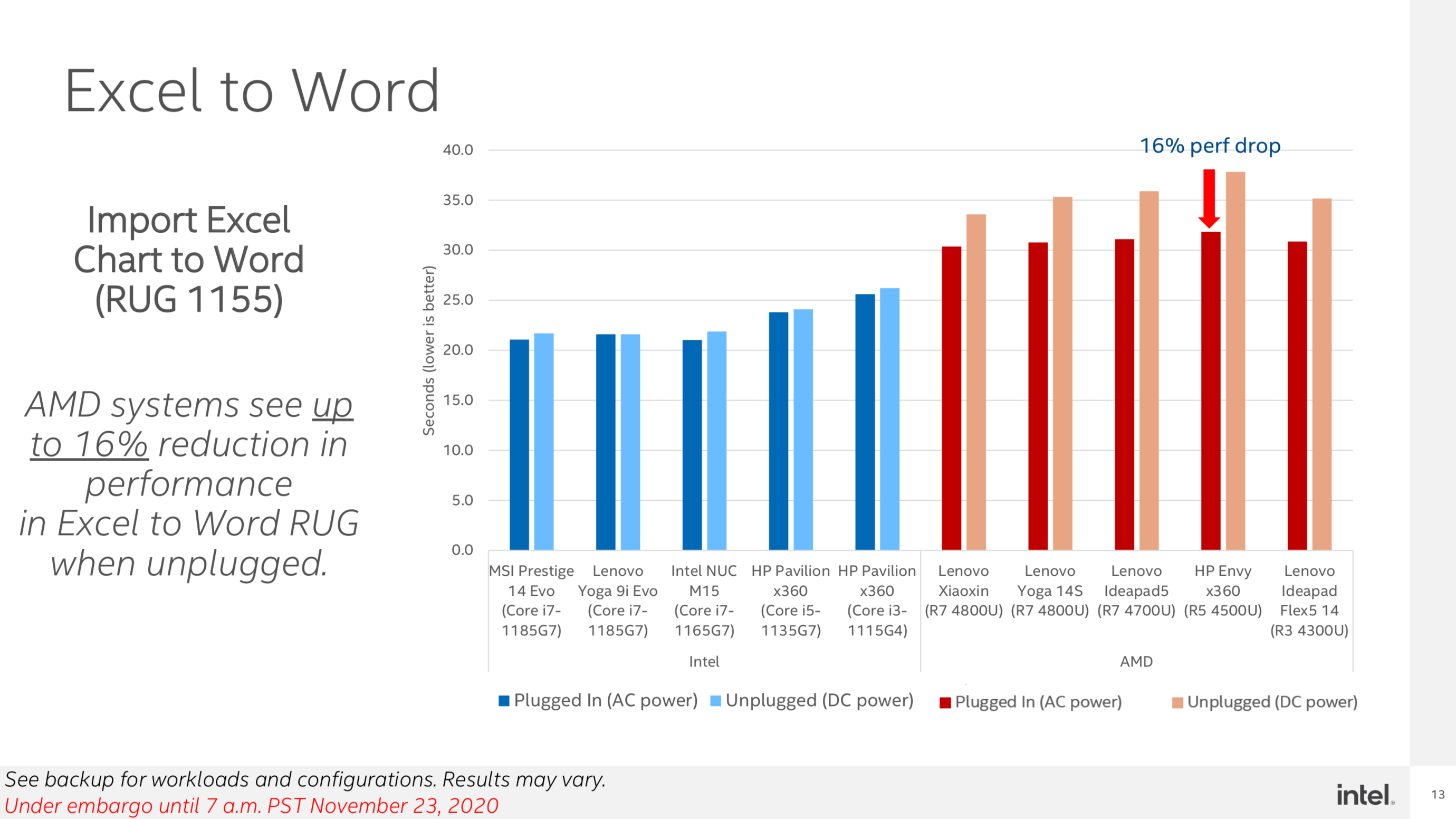
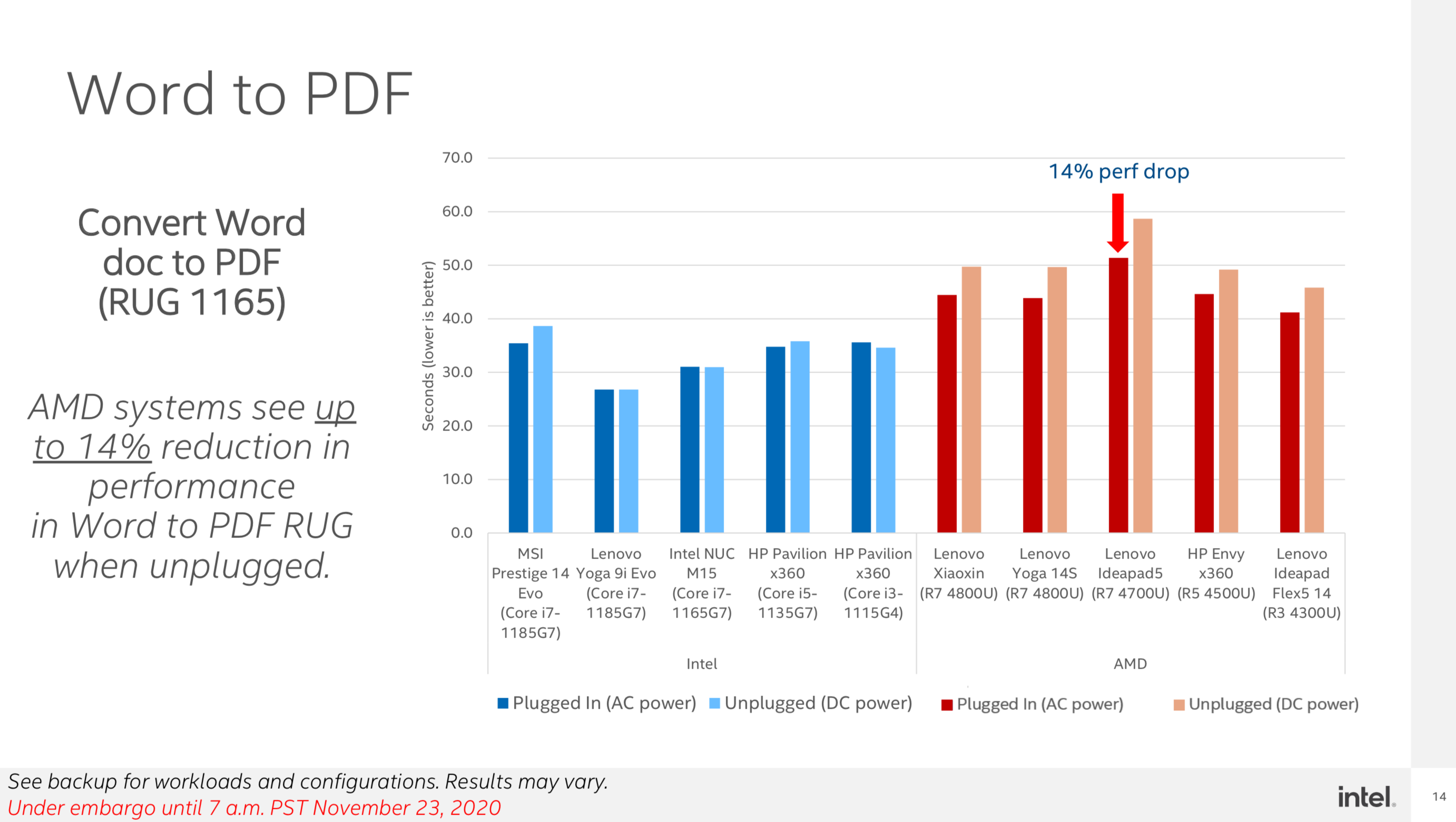
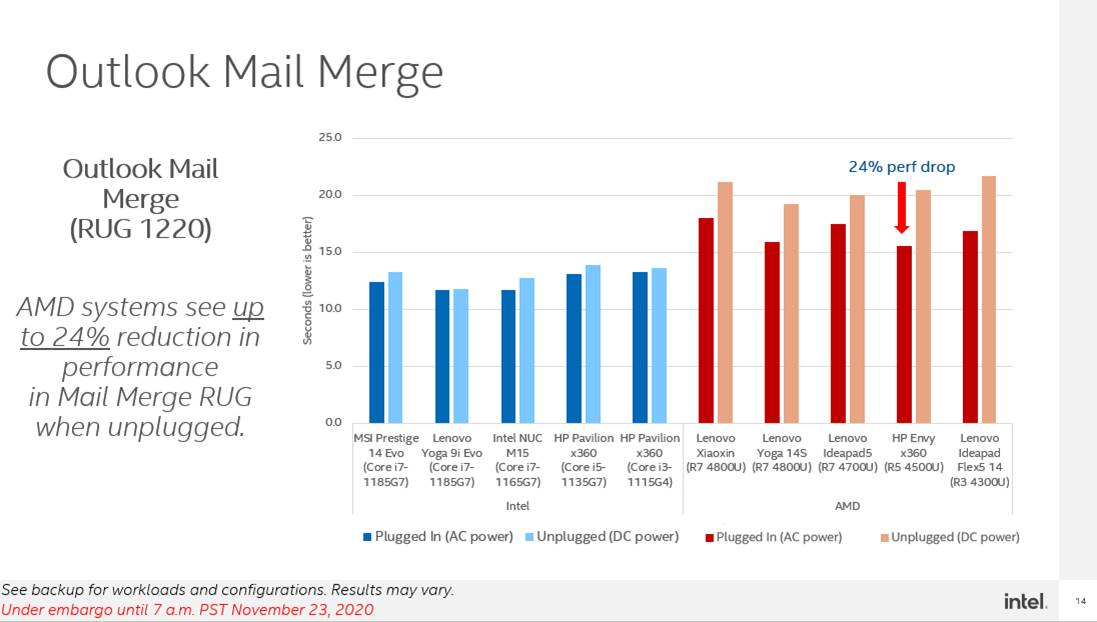
Intel pointed out in its testing that Cinebench doesn't replicate the other synthetic benchmarks or its RUGs. In that case, the systems matched up much more closely on both AC and DC power. Intel has been on a bit of a campaign against using tests like Cinebench as AMD's chips have matured, with attempts to measure "real world performance" instead. (Cinebench testing took place on R20, as the more recent R23 was not yet available,)
In the case of Cinebench, it showed its Tiger Lake chips winning on single-threaded performance, with AMD's Renoir processors beating it in multi-threaded performance.
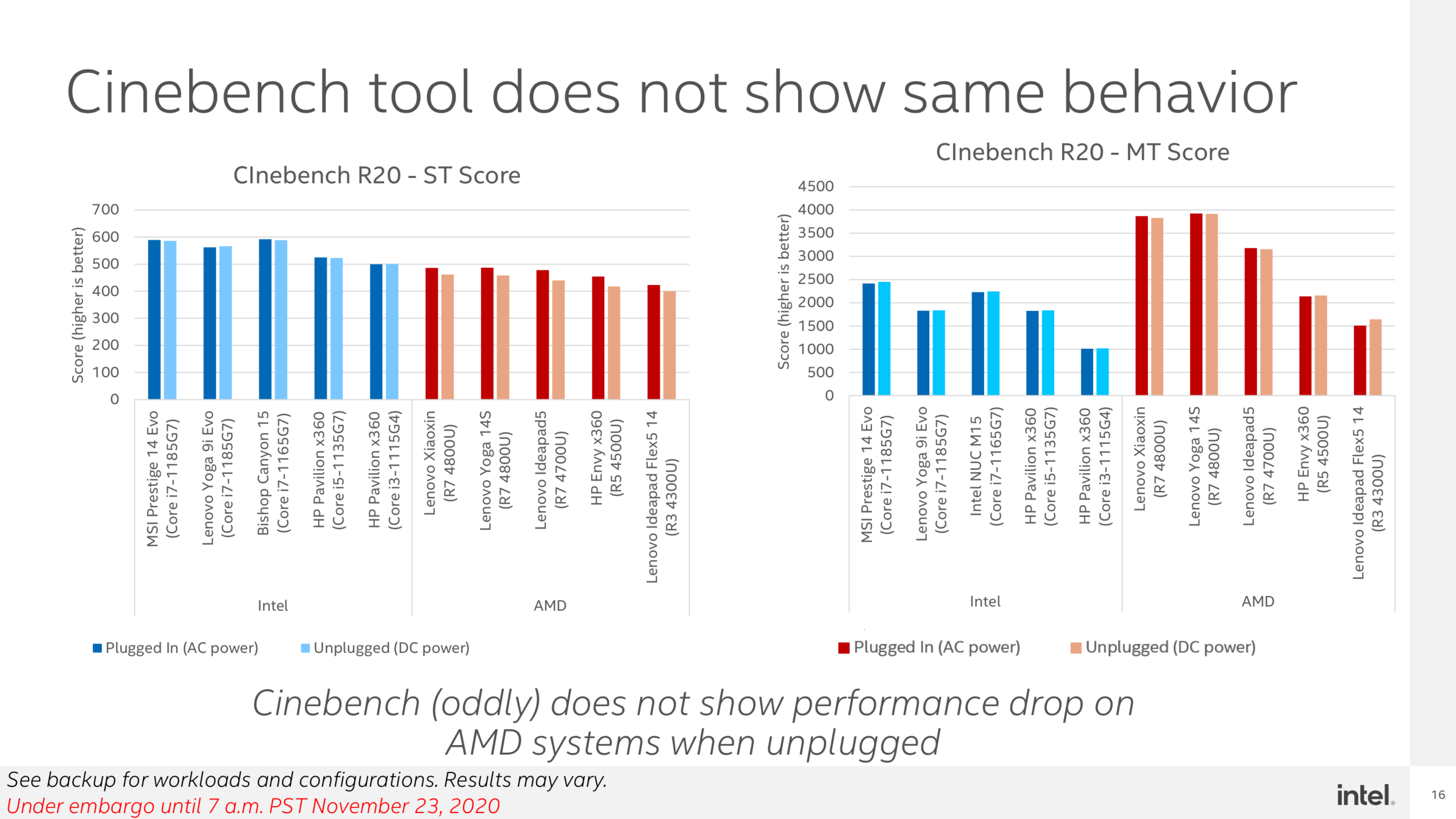
The reasoning, Intel suggests, is due to power and voltage. In an in-house "microbenchmark," the results showed AMD's Ryzen 7 4900HS and Ryzen 7 4700U delaying burst and responsiveness by up to 10 seconds. Notably, Intel didn't include its own chips in these tests. Intel used WebXPRT to show the systems limiting burst performance.
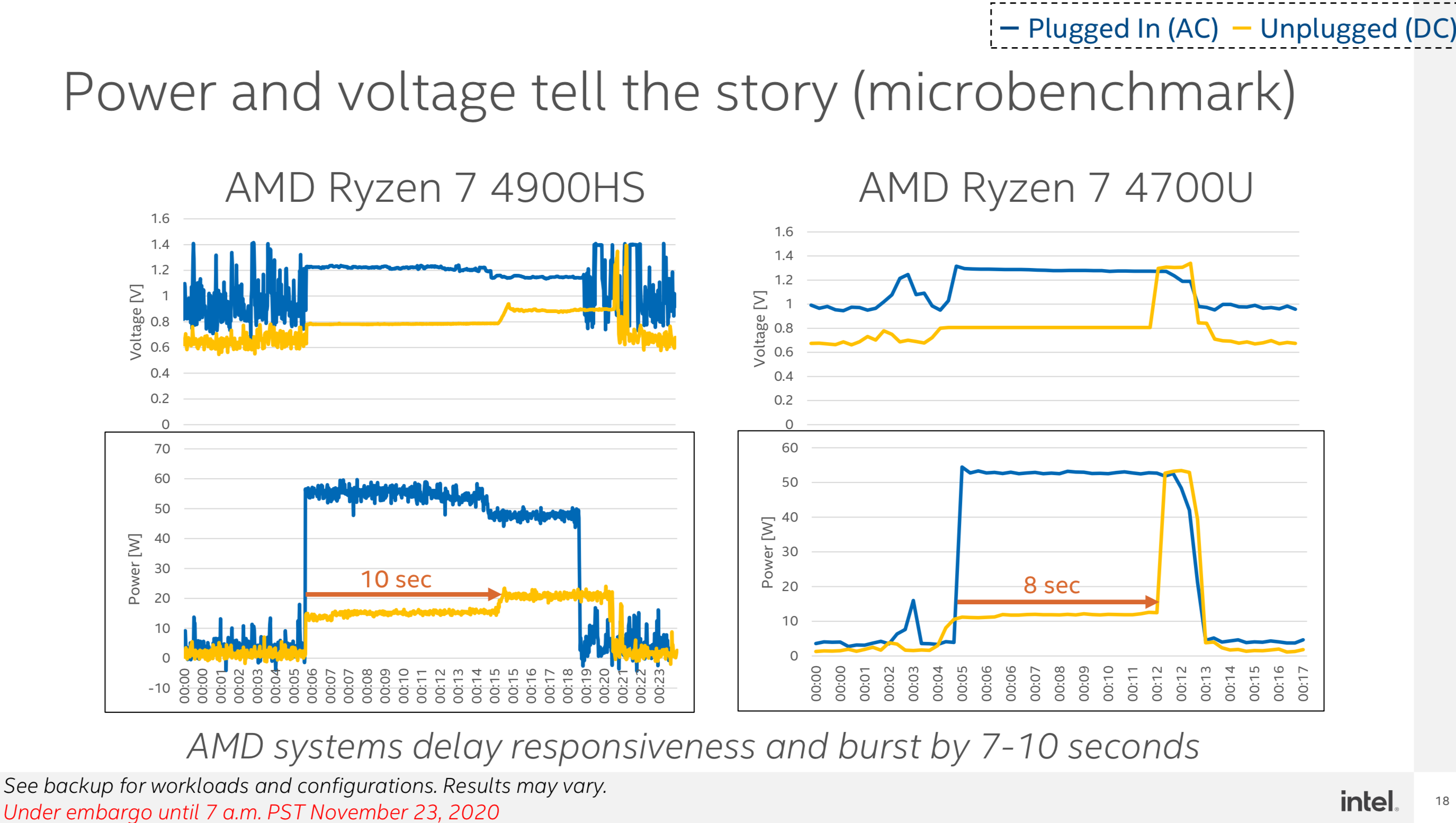
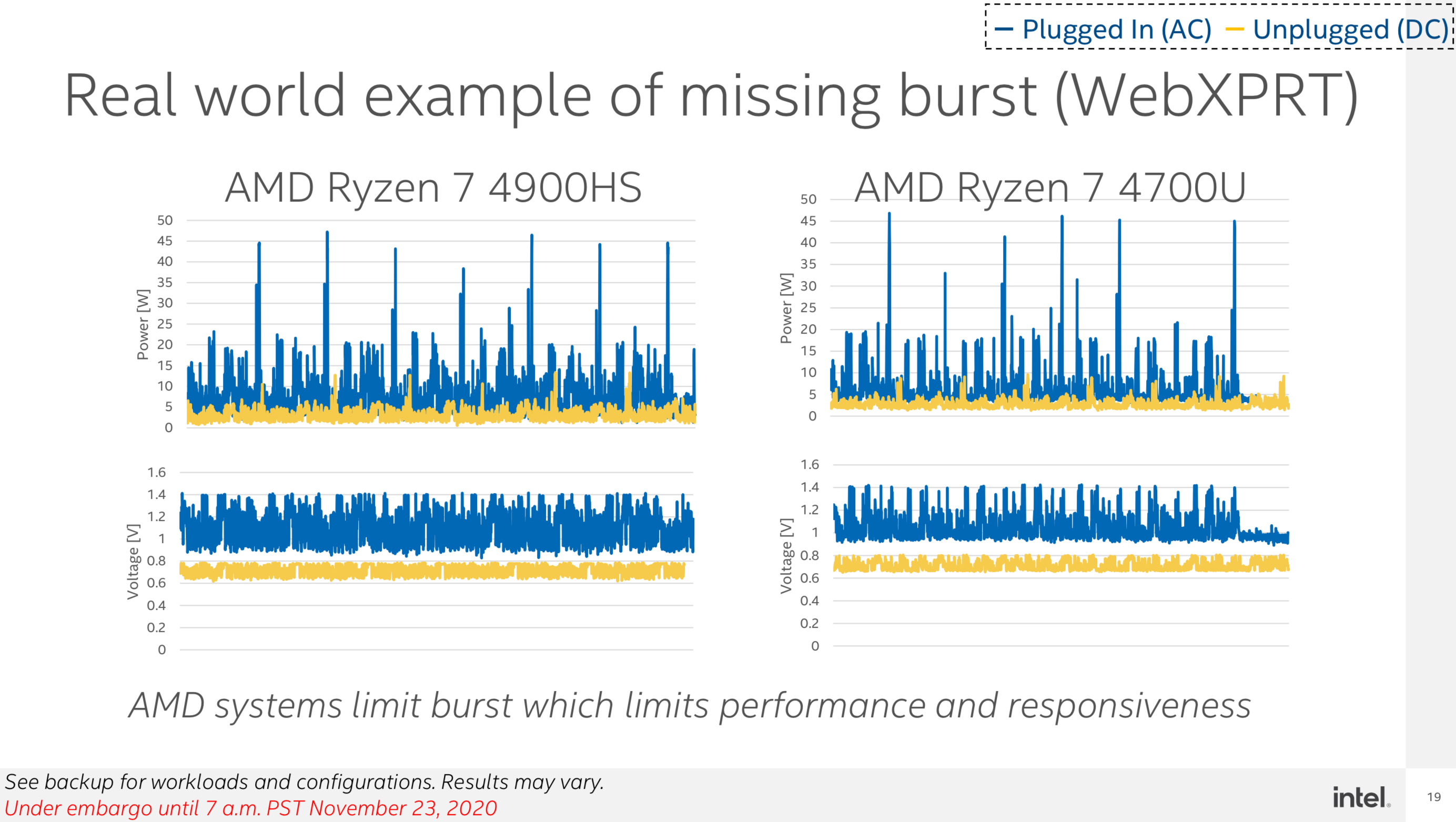
Intel first started touting performance on DC power when Tiger Lake first launched earlier this year. We did a bit of testing in this regard when we first tested the chip in a whitebox system, where a Ryzen 7 4800U lost out to Tiger Lake in Geekbench 5.2 while unplugged, but held its own in a Handbrake transcode.
Intel hasn't yet publicly compared performance, unplugged or otherwise, to its other recent competition, Apple's M1 in the MacBook Air, 13-inch MacBook Pro and Mac Mini.
The company is now pushing DC battery life as part of a real-world experience for people who use laptops, who often take them from room to room. It's using these results to push its Evo platform branding and push a purportedly positive aspect of its latest technology that's now facing more competition than ever.
Updated Nov. 23 at 12:38 p.m. ET with an updated chart for Intel's Mail Merge RUG test. The original had incorrect data, and Intel has fixed it.
Get Tom's Hardware's best news and in-depth reviews, straight to your inbox.

Andrew E. Freedman is a senior editor at Tom's Hardware focusing on laptops, desktops and gaming. He also keeps up with the latest news. A lover of all things gaming and tech, his previous work has shown up in Tom's Guide, Laptop Mag, Kotaku, PCMag and Complex, among others. Follow him on Threads @FreedmanAE and BlueSky @andrewfreedman.net. You can send him tips on Signal: andrewfreedman.01
-
jkhoward Not hard to do when OEMs put small batteries in their devices. Come on Tom’s, why even bother posting this? You know it’s not true lol.Reply -
spongiemaster Reply
This isn't about battery life, it's about system performance when running on battery. Intel TL systems tend to see much less of a performance drop when shifting to battery power vs AMD. This has been verified by third party testers.jkhoward said:Not hard to do when OEMs put small batteries in their devices. Come on Tom’s, why even bother posting this? You know it’s not true lol.
https://infogram.com/1prl7qndnng559agyype77m32kbm75pvgwq -
Neilbob And every Intel CPU there has more or less half the core/threads (and about half the performance) of their AMD equivalents*. Yes, that's very much an apples to apples comparison.Reply
Good job Intel marketing.
*When looking at multi-threaded of course -
bigdragon Did these Intel systems have all spectre, meltdown, fallout, zombieload, MDS, ...... , and ME mitigations installed?Reply
I'd like to see system vendors put AMD products in more premium mobile devices. Most systems with AMD are still budget-oriented and unappealing for serious work. A lot of that performance gap could probably be closed just by having better-designed AMD mobile systems. I do like this intensifying competition between AMD and Intel in the mobile space. Hopefully that means I'll be able to get a nicer system once it's time to replace my aging 2-in-1. -
waltc3 Poor old Intel--grasping at straws, again. Running the laptop CPU 100% on battery when the tasks would run just as well at 75% CPU employment would be fairly dumb and eat up battery power uselessly. As if Intel doesn't do exactly the same thing--it would be stupid not to. I guess Intel thinks no one plugs his laptop into a wall socket on a regular basis....! Intel, btw, will not be mentioning M1 anytime soon...right now, Intel is more concerned with AMD--and it took Intel years before the company would even admit AMD was a competitor.Reply -
CerianK Reply
Imagine what would happen to Intel (and AMD) if Apple ever figured out how to get its new CPUs supported by Microsoft (using Apples advanced x86-64 emulation techniques). (me imagines secret meetings already taking place).waltc3 said:Intel, btw, will not be mentioning M1 anytime soon...right now, Intel is more concerned with AMD--and it took Intel years before the company would even admit AMD was a competitor. -
spongiemaster Reply
Why would Intel bother? They aren't competing against Apple. People buying Apple are either buying into the ecosystem or buying the logo. None of their customers care what CPU is in the system.waltc3 said:Intel, btw, will not be mentioning M1 anytime soon...right now, Intel is more concerned with AMD--and it took Intel years before the company would even admit AMD was a competitor. -
Arbie For an analysis of Intel's claims by an industry expert, look here:Reply
https://semiaccurate.com/2020/11/23/intel-looks-at-laptop-power-usage/
And no, Demerjian isn't always right on every point. However he is always among the smartest and best informed. That's why his paywall is $1K/yr. He gives away some things for free and is always worth checking. -
watzupken I am not sure about TGL, but my experience with Intel mobile chips running on battery is no better. They certainly don't run anywhere near the full speed they advertised. Throttling CPU on battery is not something new. When you are running on battery, the priority is generally on preserving battery without losing too much performance.Reply